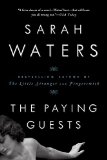Summary | Excerpt | Reviews | Beyond the book | Read-Alikes | Genres & Themes | Author Bio

The First World War was not kind to twenty-six-year-old Frances Wray's family. Her brothers were killed in action and her father died early after an illness and financial worries; now she and her mother, saddled with debts, live alone in a large house on Champion Hill, near Camberwell in south London. Though in a downmarket area, theirs is a "good-class street." Their reduced circumstances mean that they cannot keep any servants and Frances has to do all the heavy housework herself. Now they must take the seemingly drastic step of accepting lodgers – but they are too proud to call them as such, thus they are the title's "paying guests."
These "guests" are Leonard and Lilian Barber, who, though careful in their manners, still appear brash and decidedly lower-class. Len is an insurance clerk, while Lil carries on an idle existence among her knickknacks and bright clothing. They are pleasant people, but still, Frances questions her decision: "What on earth had she done? She felt as though she was opening up the house to thieves and invaders." Much as she would like to pass off "the money [as] a mere formality, and not the essence, the shabby heart and kernel, of the whole affair," Frances cannot deny how essential the extra 29 shillings per week proves to be.
As the weeks pass in that summer of 1922, Frances and her mother constantly worry about what their relationship should be to their lodgers; "'Ought we to drink with them, do you think?' What were the rules? Oh, who cared! They had got the money now." As Frances develops a sort of shy friendship with Lilian, she soon discovers that the Barbers' marriage is not a particularly happy one. Meanwhile, hints of Frances' unorthodox past emerge: she was arrested as a suffragette, and carried on a forbidden relationship. Looking at her currently staid situation in the home, she confesses to Lil, "It isn't the life I thought I would have." She longs to have a more exciting life, for "what was the alternative? Settle ever more neatly, ever more dumbly, ever more dishonestly, into her role?"
It is difficult to discuss the novel's plot other than obliquely; to go into detail would give far too much away. Suffice it to say that an illicit love affair and a shocking outburst of violence throw the household into disarray. Like a play, the story is boxed into limited settings: first the Champion Hill house, and later a courtroom, where a dramatic trial takes place. In fact, those two locales seem to divide the book neatly into two halves. To begin with, it is a subtle domestic drama, with psychological tension bubbling beneath the surface of a seemingly placid home life. Yet abruptly, at nearly the mid-point, this becomes a melodramatic crime story.
Both halves of the novel are done well, with Waters drawing first on postwar fiction and class studies, and later on sensation fiction and true crime accounts (see 'Beyond the Book'), to craft a believable narrative. However, it feels as if this is two different books put together. Waters' fans will find the novel's first 300 pages much less plot-driven than any of her previous work; they may, in fact, find themselves utterly bored by the wealth of period detail – especially what can seem like endless detailing of Frances' chores. I felt this description of Frances, given by her friend Christina, could just as aptly apply to the novel as a whole: "you're sure a queer combination of things – so conservative one minute, so reckless the next." Still, Waters' skill at evoking historical time periods is peerless, and once again she delivers romantic relationships with a powerfully erotic charge. The first half may drag somewhat, but you will simply not be able to turn the pages fast enough through the second.
![]() This review was originally published in The BookBrowse Review in September 2014, and has been updated for the
October 2015 edition.
Click here to go to this issue.
This review was originally published in The BookBrowse Review in September 2014, and has been updated for the
October 2015 edition.
Click here to go to this issue.

If you liked The Paying Guests, try these:

by Nell Stevens
Published 2025
In a grand English country house in 1899, an aspiring art forger must unravel whether the man claiming to be her long-lost cousin is an impostor.

by Lucy Ashe
Published 2024
A novel about obsessive love featuring two ballet dancers—identical twin sisters Olivia and Clara Marionetta—with a terrifying climax set in the world of ballet in pre-war London.
I always find it more difficult to say the things I mean than the things I don't.
Click Here to find out who said this, as well as discovering other famous literary quotes!
Your guide toexceptional books
BookBrowse seeks out and recommends the best in contemporary fiction and nonfiction—books that not only engage and entertain but also deepen our understanding of ourselves and the world around us.